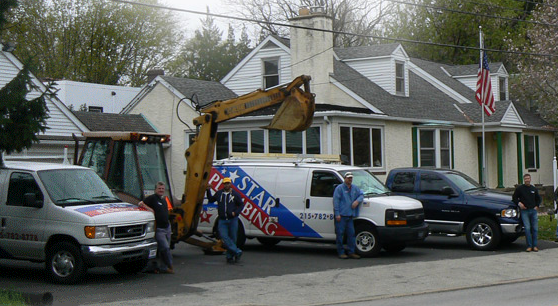How Long Does PVC Cement Last? – A Guide to Its Durability
PVC Cement is a type of adhesive used to join two pieces of PVC piping together. It creates an airtight and watertight seal, making it ideal for plumbing applications. But how long does this cement last? The answer depends on the type and quality of the cement, the environment it is stored in, and the installation method used. Generally speaking, PVC Cement can last up to 10 years or more if properly applied. However, if not properly applied or stored in an unfavorable environment, its lifespan could be much shorter.
When applying PVC cement, it is important to follow all instructions carefully and use high-quality products. This will help ensure that the cement creates a strong bond between two pieces of PVC piping. Additionally, storing the cans of PVC cement in a cool and dry place will help extend its shelf life significantly. To further extend the life of your sealant, it is recommended that you apply a primer before using the cement for optimal performance over time.
How Long Does PVC Cement Last?
Polyvinyl Chloride Solvent cement is one of the most important materials for plumbers. It is used to join pipes and fittings together, creating a strong and permanent bond. This type of adhesive is typically used more in commercial than residential settings, but it’s still a crucial part of any plumbing project. But how long does PVC cement last?
The answer to this question depends on several factors, such as the type of cement used and the conditions in which it was applied. In general, though, PVC cement is known to be very durable and can last for years without needing to be replaced.
Different Types of PVC Cement
PVC cements come in a variety of types and are designed for different uses. The most common types are Regular-Bodied, Heavy-Bodied, Medium-Bodied, and High-Strength cements. Regular-bodied cements are designed for use with small diameter pipes (up to 2 inches) and applications that require minimal seal strength. Heavy-bodied cements are designed for use with larger diameter pipes (up to 6 inches) and applications that require greater seal strength. Medium-bodied cements are designed for use with intermediate sized pipes (up to 4 inches) and applications that require medium seal strength. High-strength cements are designed for use with large diameter pipes (up to 12 inches) and applications that require maximum seal strength.
Primers & Glues
In addition to using the correct type of PVC cement, it’s also important to use the correct primer or glue when joining two pieces together. Primers help clean the surfaces before bonding them together while glues provide an additional layer of protection against leaks by offering better adhesion between two surfaces. Different primers & glues are available depending on the size & type of pipe being joined so it’s important to select the right one based on your needs. For example, some primers & glues may be suitable only for plastic pipe while others may be suitable only for metal pipe or even a combination of both plastic & metal pipe types so make sure you select the right product before starting your project!
Preparing The Pipe Ahead Of Time
Before applying any type of PVC cement or primer/glue, it’s important that you prepare your pipes ahead of time by cleaning them thoroughly and cutting them accurately to ensure proper fitment when joining two pieces together later on down the line. Cleaning your piping will help remove any dirt or debris that could interfere with bonding while cutting your piping accurately will help ensure proper fitment during installation which will result in a stronger bond with less risk of leaks afterwards!
Applying The Cement
Once all your prep work is done, it’s time to start applying the cement! Make sure you’re using the correct type of brush when applying your cement as this will help ensure an even application across all surfaces being bonded together; too much or too little can cause poor bond strength which can lead to leaks down the road! Start at one end of your piping and slowly work your way towards the other end until all surfaces have been evenly covered with an even layer of cement; let this sit for at least 30 minutes before proceeding onto installation as this will give time for optimal bonding between surfaces!
Selecting The Right Cement For Your Needs
When selecting a type of PVC cement or primer/glue there are several factors you should consider including: size & type of pipe being joined; temperature range where product will be installed; application requirements such as thickness & dry times; environmental conditions such as humidity levels; etc.. It’s important that you take all these things into account when selecting a product so you can be sure you’re getting one that best meets your needs! Additionally there may also be local codes which dictate what types & brands must be used in certain areas so make sure you check these before making any purchases as well!
How Long Does PVC Cement Last?
PVC cement is an important part of any plumbing job. It is used to seal and repair pipes, fittings, and valves to prevent leaks. The longevity of the cement depends on a few factors, including the type of cement used, the environment it is used in, and how well it was applied. In general, PVC cement can last for decades if used properly.
Working in Temperature-Controlled Environments
When working with PVC cement in temperature-controlled environments, it is important to use a sealant specifically designed to withstand extreme temperatures. This will help ensure that your pipes are sealed properly and will last for as long as possible. Sealing or repairing pipes in extreme conditions requires the use of special cements that can handle the temperature extremes without breaking down.
Avoiding Damage During Curing Period
Once the PVC cement has been applied, it must be allowed to cure for a set amount of time before coming into contact with any water or other substances that could cause damage or break down the sealant. During this time, it is important to protect the cured cement from damage due to pressure or vibration. Avoid flexible pipes when installing new parts as they can cause the cured cement to crack and break down over time due to movement and vibration.
Types of Heat Doubling PVC Cements
Heat doubling PVC cements come in a variety of types that are suitable for different jobs and environments. Some cements are designed specifically for hot temperatures while others are designed for cold temperatures. It is important to choose the right type of cement for your job so that you can ensure that your pipes are sealed properly and will last for as long as possible. Recommended brands include Oatey’s Hot Blue® Heat Doubling Cement and IPS Corporation’s Hot Blue® Heat Doubling Cement Ultra Clear™.
Knowing When To Replace Old PVC Fittings
PVC fittings can last for many years with proper maintenance but eventually they will need to be replaced due to wear and tear over time. Signs of deterioration such as cracks, discoloration, or leaks should be taken seriously as these are indications that your fittings may need replacing soon. If you notice any signs of deterioration or leaks you should replace your old fittings immediately in order to prevent further damage or water leakage from occurring.
FAQ & Answers
Q: What is the difference between PVC cements, primers and glues?
A: PVC cement is a chemical solvent used to join pieces of plastic pipe together. Primers are used to prep the surface of the plastic to ensure a strong bond with the cement. Glues are used for adhering plastic parts together, but they do not create a strong seal like that of PVC cement.
Q: How long does PVC cement last?
A: PVC cement generally has a shelf life of two to three years and can last up to 10 years when properly stored. If exposed to extreme temperatures or direct sunlight, it can deteriorate faster.
Q: What is the best way to prepare the pipe ahead of time?
A: Before applying PVC cement, it is important to ensure that the pipe is clean and free from debris. This can be achieved by using sandpaper or scrubbing with a brush and warm water. It is also important that the pipe has been cut to size before applying the cement.
Q: What type of brush should be used when applying PVC cement?
A: When applying PVC cement, it is best to use a brush with soft bristles such as a paintbrush or chip brush. This will help ensure an even application and prevent any clumps from forming on the surface of the pipe.
Q: How do I select the right type of PVC cement for my needs?
A: When selecting a type of PVC cement, it is important to consider what type of plastic pipes you are working with as well as other factors such as temperature and chemical resistance. It may also be beneficial to consult with a professional before making your selection in order to determine which type would be best suited for your application.
In conclusion, PVC cement can last for a long time depending on the quality of the product and how well it is installed. It is important to use a high-quality cement for your project and to follow the manufacturer’s instructions for installation. Properly installed PVC cement can last for years with no issues, and if any repairs are needed, it can be easily fixed with additional cement.
Author Profile

-
Star Plumbing, located in Elkins Park, PA, is a full-service plumbing company owned and operated by Mitchell Gordon. Since its inception, Star Plumbing has been providing its customers with reliable, quality plumbing services.
The Star Plumbing website offers informative articles on DIY plumbing and plumbing equipment, offering readers helpful advice and tips on how to take care of their own plumbing needs. This is a great resource for those who are looking to tackle a plumbing project themselves, as it provides useful information and advice on how to safely and successfully complete a plumbing job. Additionally, the website provides detailed descriptions of the various plumbing tools and equipment that are available, as well as detailed instructions on how to use them.
Star Plumbing’s website is a great resource for anyone with plumbing needs. Whether a customer is looking for advice on how to take care of their own plumbing or to schedule service from Star Plumbing, the website offers helpful advice and information for all their plumbing needs.
Latest entries
- April 12, 2024Plumbing Equipment And AccesoriesI Tested And Ranked The Best 10 Inch Rough In Round Toilet: And Here’s What I Found
- April 12, 2024Plumbing Equipment And AccesoriesI Tested And Ranked The Best Stone That Cleans Toilets: And Here’s What I Found
- April 12, 2024Plumbing Equipment And AccesoriesI Tested And Ranked The Best Heat Tape For Plumbing: And Here’s What I Found
- April 12, 2024Plumbing Equipment And AccesoriesI Tested And Ranked The Best Kaboom Toilet Bowl Tablets: And Here’s What I Found
